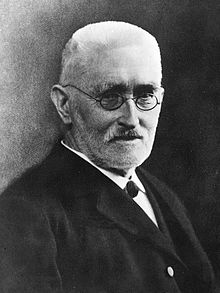Richard Dedekind
| Richard Dedekind | |
|---|---|
 |
|
| Born |
6 October 1831 Braunschweig, Duchy of Brunswick |
| Died | 12 February 1916 (aged 84) Braunschweig, German Empire |
| Nationality | German |
| Fields |
Mathematician Philosopher of mathematics |
| Alma mater |
Collegium Carolinum University of Göttingen |
| Doctoral advisor | Carl Friedrich Gauss |
| Known for |
Abstract algebra Algebraic number theory Real numbers |
Julius Wilhelm Richard Dedekind (6 October 1831 – 12 February 1916) was a German mathematician who made important contributions to abstract algebra (particularly ring theory), algebraic number theory and the definition of the real numbers.
Dedekind's father was Julius Levin Ulrich Dedekind, an administrator of Collegium Carolinum in Braunschweig. Dedekind had three older siblings. As an adult, he never used the names Julius Wilhelm. He was born, lived most of his life, and died in Braunschweig (often called "Brunswick" in English).
He first attended the Collegium Carolinum in 1848 before transferring to the University of Göttingen in 1850. There, Dedekind was taught number theory by professor Moritz Stern. Gauss was still teaching, although mostly at an elementary level, and Dedekind became his last student. Dedekind received his doctorate in 1852, for a thesis titled Über die Theorie der Eulerschen Integrale ("On the Theory of Eulerian integrals"). This thesis did not display the talent evident by Dedekind's subsequent publications.
At that time, the University of Berlin, not Göttingen, was the main facility for mathematical research in Germany. Thus Dedekind went to Berlin for two years of study, where he and Bernhard Riemann were contemporaries; they were both awarded the habilitation in 1854. Dedekind returned to Göttingen to teach as a Privatdozent, giving courses on probability and geometry. He studied for a while with Peter Gustav Lejeune Dirichlet, and they became good friends. Because of lingering weaknesses in his mathematical knowledge, he studied elliptic and abelian functions. Yet he was also the first at Göttingen to lecture concerning Galois theory. About this time, he became one of the first people to understand the importance of the notion of groups for algebra and arithmetic.
...
Wikipedia
